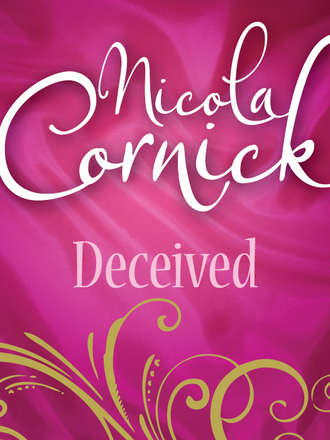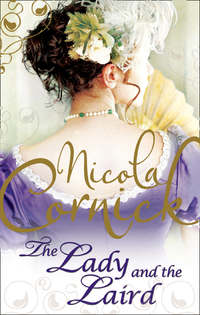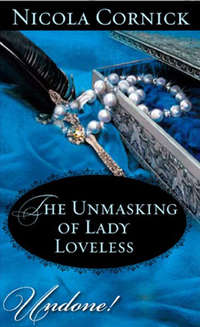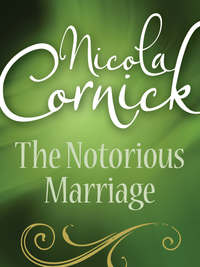
Полная версия
Deceived
“Miss Penelope Standish, Your Serene Highness.”
The butler’s smooth tones broke into her thoughts. Belton spoke with the air of a man announcing news in somewhat dubious taste. It had been clear to Isabella from the beginning that Belton was a servant of discrimination, who felt it might be slightly beneath his dignity to work for a family where the genes of King George’s fishmonger were combined with the poor reputation of a third-rate European prince. After all, he had served the most high-ranking families of the land. This could only be construed as a comedown.
The butler’s tone was not lost on the young lady who entered the library, for she gave him a twinkling smile. When he responded with a faint but irresistible twitch of the lips, she went into a peal of laughter.
“Good evening, Belton. I always have the impression that you wish you had a respectable duchess to announce.”
“Madam…” the butler said repressively. “It is scarcely my place to express a preference.”
Pen gave him another melting smile, very like her sister’s, and came forward to kiss Isabella.
“You look very doleful this evening, Your Serene Highness,” she said. “Have you lost a guinea and found a groat?”
“Please drop the Serene Highness nonsense,” Isabella besought. “I have asked Belton time and time again, but he insists that it is not appropriate merely to call me madam.”
“I should think not,” Pen said cheerfully, throwing herself down on the sofa with hoydenish abandon. “The least you can do is give your servants the gratification of addressing you properly if they have the privilege of working for a princess. There is nothing worse than a lady of consequence who will not accept her own importance, you know.”
“You talk a great deal of nonsense,” Isabella said. Nevertheless, she felt cheered. Until Pen had arrived she had been drinking a solitary cup of tea and staring blankly at the newspapers, wondering what the Gentlemen’s Athenian Mercury would make of the real truth. She had importuned a former lover to marry her; she had contracted the marriage in the Fleet Prison and she intended to have it annulled as soon as she could. If the editors of the papers knew the true story, their gossip columns would likely burst into flames.
“You look tired,” Pen was saying solicitously.
“I have not slept,” Isabella said with a sigh. “It puts me out of countenance.”
It was not in fact accurate to describe the last night as sleepless. Her bouts of wakefulness had been punctuated by broken dreams about Marcus of such astoundingly erotic content that she had been dizzy and aroused upon awakening, unable to banish him from her mind. She had been forced to dredge up her Latin declensions in order to try and bore herself to calm. It was the third night it had happened and thinking of it now was sufficient to put her out of countenance all over again.
“Are we not to attend the Duchess of Fordyce’s rout?” Pen inquired, stripping off her gloves. She gestured to her rose-pink gown. “Here I am dusting down the only dress in my wardrobe worthy of the occasion and I find you sitting here with a face like a December morning.” Her comical expression faded. “Oh! I forgot—you were to see Mr. Churchward this week about Ernest’s debts, were you not? Was it so very bad?”
“Worse than very bad,” Isabella confirmed.
Pen made a tutting sound. “Then I am surprised not to find you at your packing,” she said. “Was Mr. Churchward’s advice not to return to the continent?”
“It was one of the suggestions that he made,” Isabella said evasively. She did not intend to tell Pen about her marriage of convenience. This was no altruistic move designed to spare her sister the shock, but sprang from the certain knowledge that Pen would disapprove and, further, would express that disapproval in very pithy terms. And since Isabella intended to dissolve the marriage before the ink was dry on the certificate, there was no need for Pen to know anything. It would have been nice to have a confidante, but in recent years Isabella had become used to keeping her own counsel and, besides, she knew the one thing it would be dangerous to discuss was Marcus Stockhaven.
“This house is to be sold,” she continued. “Not that I regret that particularly, since it was Ernest’s and he furnished it in his customary deplorable taste.”
Pen looked around at the ostentatious golden ornaments and flamboyant decor. “It would be appropriate for a bawdy house,” she conceded, “but I cannot favor it for a residence.”
“Mr. Churchward thinks that a nabob may buy it,” Isabella said gloomily. “Home from home, so to speak.”
“A sound idea.” Pen reached over and rang the bell for another cup of tea. “And if you need additional funds,” she added, “you could sell off those gaudy knickknacks Ernest bought one by one.”
Isabella shook her head. “They are worthless. Just as my jewelry is mostly paste, so are the ornaments all made of gilt. The Di Cassilis treasures were pawned years ago to pay for Ernest’s pleasures.”
Pen sighed. “How very frustrating. You must have been tempted to go upstairs, cut up all of Ernest’s English clothes and throw them into the streets out of sheer revenge.”
Isabella frowned. “I cannot destroy those,” she said. “I need to sell them.”
The door opened to admit a footman carrying a tea tray with a fresh pot, a china cup and several floury scones.
Pen poured. “Scones at this time of the evening!” she said delightedly. “What a marvelous way to fortify oneself for a ball.” She stirred honey slowly into her tea. “Where will you live when the house is sold, Bella?”
“I intend to live quietly at Salterton Hall on the money that Aunt Jane left me,” Isabella said. “I rather fancy becoming a recluse.”
Pen, who was about to take a mouthful of tea, almost choked.
“You have windmills in your head, Bella, if you imagine that retiring to a seaside resort will turn you into a recluse,” she declared. “Surely you realize that you will always remain an object of curiosity, especially in a small society like that of Salterton?”
“After racketing around Europe in Ernest’s shadow, I assure you that a little peace and quiet is what I require,” Isabella said. “I am persuaded that Salterton will not find me in the least bit scandalous or even interesting.”
Pen gave a disbelieving snort. “And I assure you that they will. If I had any money I would bet on it.” The derisive note faded from her voice. “You will become bored, you know, Bella. It may seem appealing now to settle in a quiet backwater, but in a short while you will be looking for occupation.”
“I am sure that I will find something with which to occupy myself,” Isabella said comfortably. She had thought long and hard about her future and the idea of a quiet retirement was hugely attractive. “The sea cure, the circulating library, the visitors from Town…All will provide me with distraction.”
Pen’s face lit with a smile. “You could always write letters, I suppose. I remember that you were a prodigiously interesting correspondent during your marriage.”
Isabella grimaced. “I thank you, but no.” She tapped the newspaper. “It seems that some enterprising person has already chosen to profit from my activities. It is only a matter of time before my letters make it into print. It is most vexing,” she added. “Such a shoddy little publication, as well!”
“Would it have been better had the gossip been printed in the Times?” Pen inquired.
“Certainly. One gets a better standard of scandal in those sorts of papers.” Isabella sighed gustily. “It cannot be helped. My entire married life has been dogged by quizzes and gossips. But you will forgive me if I do not set pen to paper again.”
Pen’s brow was furrowed as she scanned the column in the paper.
“Do you know who is writing this?”
Isabella shrugged. “It could be anyone. Acquaintances, servants…Certainly it seems to be someone who has more than a little knowledge of my life.”
Pen bit her lip. “Do you intend to try and find out who it is?”
Isabella raised her brows. “I shall not bother. A little more tittle-tattle can scarcely harm me.”
Pen put the paper aside. “So if you are not to write letters,” she said, “the seawater cure it is. Assuming that you do not expire from the excitement first!” She paused. “You do know that you will have Marcus Stockhaven as tenant at Salterton? Aunt Jane leased Salterton Cottage to him when he and cousin India were married.”
Isabella, whose teacup had been balanced precariously on the arm of her chair, now jumped so much that the liquid cascaded onto the floor.
“Marcus Stockhaven? Why did you not tell me before?”
She realized that her words had come out much more stridently than she had intended. Pen was staring at her, a little flushed.
“Well, upon my word! I had no idea that the matter would be of such great import to you after all these years,” she said. “Is it not Mr. Churchward’s job to acquaint you with your inheritance, rather than mine?” She paused, adding more lightly, “Marcus has seldom visited Salterton since Aunt Jane died. You need have no fear of meeting him unexpectedly, if that is what concerns you.”
“I beg your pardon,” Isabella said, still flustered. Her pulse was thrumming and her heart beating in her throat, and it was the mere mention of Marcus’s name that had done it. God forbid that she should meet him again. She would be a quivering wreck. But of course, she would not. She reminded herself that he was in prison. Perhaps the tenancy of Salterton had been a problem for him. Since he did not own the house, he would not have been able to sell it to settle his debts.
She used the opportunity provided by the spilled tea to turn away from Pen and gather up her shattered control. “I did not intend to sound so sharp, Pen. I was merely surprised.” She looked up, as flushed as Pen from surprise and guilty conscience. “I do apologize.”
Pen looked evasive. “Oh, it is nothing to the purpose. It must have slipped the minds of both Aunt Jane and myself to mention it in our correspondence.”
Isabella hesitated. There was an odd tone in Pen’s voice and an odd feeling in the room, as though something had been left unsaid. She waited but Pen merely avoided her gaze and fidgeted with her teaspoon, smearing honey over the saucer.
“I infer that Mr. Churchward did not mention the matter to you at all?” Pen added.
Isabella’s shoulders slumped. She recalled that on her first meeting with Churchward after she had returned to England, the lawyer had indeed attempted to tell her something of the encumbrances upon her new estate, but she had waved the matter aside. The issue of Ernest’s debts had become far more pressing than any other matter and she had forgotten all about the details of Salterton. It looked as though it would prove to be an expensive oversight. It seemed that she was tied to Marcus Stockhaven in more ways than she had anticipated, and none of them were welcome.
“No, he did not,” she said. “How provoking!”
Pen raised her eyebrows. “That Churchward forgot to tell you?”
“No! Yes!” Isabella collected herself. “I do recall him mentioning something about a tenant, but I did not pursue it.”
“Oh well…” Pen seemed anxious to let the subject go. “I imagine you will not be much troubled by Marcus. Salterton Cottage was damaged by fire a few months ago and is uninhabitable. Besides, Marcus chooses to live elsewhere—or to travel. One seldom sees him in society. I am not even sure where he is now.”
Imprisoned in the Fleet for debt, Isabella thought.
She swallowed a variety of uncomfortable feelings and kept quiet. Her overriding emotion was a deep and heartfelt desire for Marcus to be kept under lock and key. If he were ever to be free…the very thought of it was sufficient to make her insides quake.
At the same time, she was puzzled. What had happened to render Marcus’s financial state so dire? She had asked him but he had declined to explain and she had not pressed. Now she wished she had.
“I imagine you will not be much troubled by him…”
Truth to tell, she was already far more troubled by Marcus Stockhaven than Pen would ever know.
Her sister was fidgeting with her cup.
“I wish I could help you, Bella,” Pen was saying. “Financially, I mean. I know this is not how you would have wished your return to England to be.”
Isabella shook her head. She appreciated her sister’s generosity but Pen subsisted on next to nothing as it was. Their father had left her a small allowance, enough to permit her to live quietly in an unfashionable corner of London, but there was certainly not enough to make any kind of impression on Ernest’s debts.
“You are all kindness, Penelope,” she said, smiling, “but my situation is not too dreadful. I have managed to stave off bankruptcy for a few months and once this house is sold, I shall be solvent again and able to afford to live in the country if I am careful. In fact my plans are falling out rather well.”
Rather well if one discounted the small inconvenience of an unwanted husband, she amended silently. She made a mental note to ask Mr. Churchward for the particulars of annulment at once. She hoped that he might be able to speak of matters such as non-consummation of the marriage without too much personal embarrassment.
Pen’s chatter recalled her thoughts.
“I warrant that some country gentleman will snap you up,” her sister was saying. “A man of fortune and standing in Salterton society, who has great plans for the development of the place as a resort and wishes for a titled wife to add to his prestige.”
“God forbid,” Isabella said, shuddering. “I fear I would be too outrageous for such an upright man.”
Her sister looked at her. “True,” she said, after a moment. “There is something—” she hesitated “—something too sophisticated about you to sit comfortably in a small town with a small-town husband. You would always do something scandalous and shock the local worthies. I know you.”
“I am not scandalous!” Isabella objected. “Ernest was scandalous. I am quite…”
“Quite?”
“Quite respectable.”
“Doing it too brown, Bella,” Pen said with relish. “It is true that you are not disreputable in the sense that Ernest was, but being a princess has conferred certain privileges on you that make you dismissive of society’s rules.”
“I insist that you give an example,” Isabella said indignantly.
“Very well.” Pen seemed calmly assured of the truth of her assertion. “You put your elbows on the dinner table. You address the servants directly as though they were real people. You have been known to attend a sparring match at the Fives Court. You have ridden one of those newfangled hobbyhorse wheeled contraptions, which no lady could consider genteel—”
Isabella waved a dismissive hand. “Such matters are scarcely outrageous!”
“You told the Duchess of Saint Just that she treated her niece worse than a scullery maid—”
“Well, so she did. She forced the child to starch the linen until her fingers blistered!”
“And you told Prince Bazalget that he was an old lecher to consider marrying a seventeen-year-old girl.”
Isabella opened her eyes very wide. “I have strong feelings on such a subject.”
“Understandably,” Pen said. “But you do admit the accuracy of what I am saying?”
Isabella deflated a little. “I suppose so. Manners do not make this princess, do they?”
Pen leaned across and gave her a spontaneous hug. “You are splendid, Bella. But you will never be respectable.”
A certain raucous noise from the entrance hall at that moment suggested that the remaining member of the Standish family had arrived and that Isabella was not the only one to be less than respectable. Belton threw the library door open.
“Lord Standish,” he announced with dreadful calm, as though the evening could only degenerate further.
Like his sisters, Freddie Standish was very pleasing to the eye. Fair and slim, he was a general favorite with the matrons as long as he made no attempts to seek fortune by marrying one of their daughters. He shared the modest house in Pimlico with Pen and worked—nominally, at least—for a banker who liked the prestige of having a titled gentleman to deal with the social side of his business. Despite the ignominy of his situation, Freddie always seemed good-humored and blessedly unflustered. Isabella loved him for it, though Pen maintained with dry affection that Freddie only had one mood because he was too stupid to have developed a range of them.
“Good evening, Freddie,” Isabella said, tilting her face up for his kiss of greeting. “I was telling Pen that I have managed to stave off bankruptcy for a few months, until the house is sold.”
“Congratulations,” Freddie said, sitting down on the sofa and ungallantly obliging his sister to move up to give him more space. He looked about him. “Never liked the place myself. Far too vulgar.”
“Yes, it is,” Isabella said with a sigh. “I shall be retiring to Salterton instead.”
Freddie looked horrified. “Salterton? In Hampshire?”
“Dorset,” Pen snapped. “I told her it was a foolish idea.”
“Quite right,” Freddie said. He helped himself to one of the buttered scones on the dainty china tea plate. “Dorset is unspeakably dull. Why not try Kent instead, Bella?”
Isabella heard Pen give an exaggerated sigh. Not for the first time she wondered how the bookish and sharp-witted Penelope and the intellectually slow Freddie ever managed to share a house in anything approaching harmony.
“You will not wish to visit me, then,” she said.
“No danger of that,” Freddie said cheerfully. “I would rather work for a living than retire to Dorset.”
“You are already supposed to work for a living,” Pen pointed out.
“Only notionally,” Freddie said with a cheerful grin.
“Unfortunately I do not have that option,” Isabella said briskly. “As a governess or a maid I would earn insufficient money in my entire life to cover Ernest’s debts. And the only other alternative is to become a cyprian. I suppose one may work from home and do hours to suit—”
“Steady on, Bella!” Freddie was so scandalized that his half-eaten scone slipped off his tilting plate. Pen retrieved it.
Isabella patted his arm. “I apologize, Freddie. I was only speaking in jest.”
“So I should hope,” Freddie said, squaring his shoulders. “Head of the family. Couldn’t approve. Sorry, Bella, but there it is.”
“Of course not,” Isabella said comfortingly.
“I would rather you married Augustus Ambridge than contemplate a career as a demimondaine,” Freddie said. “And you won’t hear me say that very often.”
This time it was Pen who intervened. “I cannot agree with you, Freddie. Augustus Ambridge is the most tiresome bore.”
They fell to squabbling like a pair of schoolchildren and Isabella sighed. It was fortunate that one of the alternatives she was not considering was sharing the Pimlico house with her siblings. In that event she would likely run mad within two days. They did not even notice when she slipped out of the room to find her cloak and evening slippers for the ball.
As she came down the staircase, she met Belton in full sail, like a galleon with a following wind.
“Lord Augustus Ambridge has arrived and is awaiting you in his carriage, Your Serene Highness,” Belton announced, with a hint of approval in his voice at long last.
“Thank you, Belton,” Isabella said. She put her head around the library door, cutting through the wrangling of her brother and sister with a crisp:
“Children! Lord Augustus is here to escort us to the ball.”
“Just like the fairy godmother,” Pen said. She rose to her feet. “I am looking forward to this evening, Bella. As it is your first social event in the Ton since your widowhood, you may prove to me just how inconspicuous you can be.”
“I intend to,” Isabella said, glaring repressively at her. “I shall be as quiet and retiring as a nun, I assure you. It will be in no way a night to remember.”
CHAPTER SIX
ISABELLA HAD ALWAYS CONSIDERED royalty to be vastly overrated. The same people who bowed and smiled this evening as she glided along the sumptuous red tartan carpet at the Duchess of Fordyce’s Scottish reception would have cut her dead when she had been little Isabella Standish, without a handle to her name or a feather to fly. In fact they had cut her dead. She recognized plenty of faces from her season as a debutante twelve years before but reflected that it was more likely that she would recognize people’s backs. She could still recall them turning away in disdain and those long-ago whispered conversations:
“Who is that?”
“Nobody, my dear…That jumped up fishmonger’s granddaughter, Isabella Standish…”
“Oh, oh I see…. I thought she looked well to a pass but now I realize that she is nowhere near as pretty as she would have been with a title and a fortune….”
Isabella paused patiently while Lord Augustus halted to receive the greeting of the Duchess of Fordyce herself, flanked by her three unmarried daughters and the bored-looking son and heir to the Fordyce millions. John Fordyce had brightened when he spotted Penelope following behind. Gentlemen did brighten when they saw the angelic-looking Penelope. The good impression generally lasted until she opened her mouth, when everyone else realized what Isabella and Freddie already knew—that she was a bluestocking with a tongue that could flay you alive.
“Lord Augustus!” The duchess was smiling so hard that Isabella feared her rouge would crack. She had heard that Her Grace seldom smiled for fear of the aging effect of wrinkling. Tonight, however, she had evidently granted herself a special dispensation.
“How utterly delightful to have you back with us in London, my lord,” the duchess said. “And with your dazzling companion! Your Serene Highness…” A fulsome curtsy followed. “Thank you for choosing to adorn our event this evening.”
Isabella heard Penelope give a snort of derision that she did not even attempt to turn into a cough. She gave her sister a quelling look.
“It is a great pleasure to be here, Duchess,” Isabella said, adding with scrupulous truth, “Your Scottish exhibition is quite spectacular.”
It was indeed. Ever since the Prince Regent had started a craze for all things Caledonian earlier in the year with his sudden and rather awkward nostalgic attachment to the Stuart dynasty, the Tory hostesses has adorned their houses with tartans and bagpipes and the dancing was all reels and strathspeys. Isabella could hear a fiddler tuning up in the ballroom to the right of them; when the strains of the violin where joined by the wheeze of the bagpipes, several people in the vicinity had the pained expressions of those suffering the earache.
“How marvelous,” Isabella said, as the duchess winced at the sound. She turned to Augustus. “We must certainly dance the reel later, my lord.”
The duchess beamed in relief and Augustus smiled, too, and gave Isabella’s arm a little squeeze of approval, which irritated her with its proprietory overtones. Augustus, whom she had first met when he was a diplomat at the Swedish Court and she and Ernest were in exile there, had never been any more than a useful escort to social events. She suspected that like many men over the years, he liked to give the impression of being more than merely her friend. Her presence gave the staid diplomat a slightly risqué, man-of-the-world aura that she knew he enjoyed. Yet if it had come to marriage, she knew that matters would have been very different. There was no possibility that Augustus Ambridge would have taken on her reputation and her debts in any formal sense. He would have run from the thought like a lily-livered rabbit.
The duchess was greeting Penelope now. Her tone had cooled by at least ten degrees since she was speaking to someone with barely a title and very little fortune, whom she had identified as being an unsuitable prospect for her son. It seemed that John Fordyce had other ideas, however. Led astray by Pen’s dazzling prettiness, he asked for her hand in the next Scottish dance.









